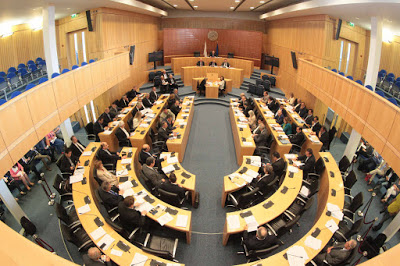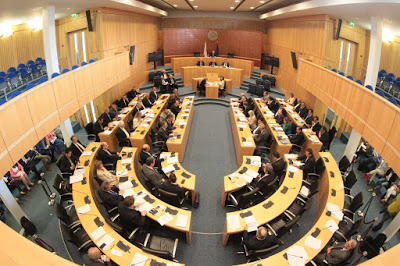The Office considers that the increase in parliamentary associates has not been documented
With regard to the Members of Parliament who will be elected in the future, the Office's view is that it is not cost-effective and economical to maintain a professional pension plan only for a number of government officials and Members of Parliament.
The Special Report of the Auditor General of the Republic Odysseas Michailidis was published yesterday regarding the audit carried out on the accounts of the House of Representatives for the year 2016.
Regarding the number of parliamentary associates, the Audit Office considers that the need to increase the Budget for parliamentary associates by 37% and the number of parliamentary associates by 46% in less than a year has not been adequately documented, as would be expected, especially in the unfavorable economic conditions that the country is going through.
It is suggested that the Services of the House of Representatives, in collaboration with the Ministry of Finance and the parliamentary parties, proceed with a study of the issue, so that its regulation in the future is not based on cyclical, but on objective data and criteria.
Defining criteria
Otherwise, there is a visible danger, when in the next parliamentary elections the power of some parties will naturally change, there will be a need to further increase the total number of parliamentary associates.
For this reason, it is suggested that the proposed study proceed immediately and the definition of the criteria be done soon, but these criteria will apply after the next parliamentary elections, so that any regulation is not affected by current circumstances.
Coverage of employment costs
Regarding the allowance for the Secretariat Services, the report states that according to the Law on Ministers and the President, the Vice President and the Members of the House of Representatives (Remuneration) Law 22/1960, as amended by Law 79 (I) / 1995 , since 1996, a monthly Secretariat allowance of ύψ 300 (€ 512,58) has been granted to Members of Parliament, which since 2005 has been revised to £ 600 or € 1.025,16 (Amending Law 111 (I) / 2005).
The above allowance is intended to cover the employment expenses of the individual MPs themselves for the provision of secretarial services. It is also noted that the above allowance is considered a pensionable benefit and, therefore, upon their departure from the parliamentary office they receive an increased pension of € 513 per month and an increase in the tip of € 28.704 (in the case of two-term MPs).
Performance allowance
The performance allowance that MPs receive currently amounts to € 1.945,75 per month (€ 23.349 per year). It is noted that the above allowance increases with the current index adjustments and is considered a pensionable benefit and, therefore, upon their departure from the parliamentary office they receive an increased pension of € 973 per month and an increase in the tip of € 54.481 (in the case of MPs with two terms).
Travelogues of Members of Parliament
By decision of the Council of Ministers, date 13.7.2005 no. 62.358, a single flat-rate amount of compensation was set, amounting to € 683,44 per month, against travel expenses for all Members of Parliament, regardless of place of residence, for their participation in the sessions and other work of the House.
It is also noted that, according to a previous decision of the Council of Ministers, date. 9.1.2002, no. 54.875, travel expenses were paid only for Members of Parliament residing outside Nicosia:
• For all Members living in Paphos € 384,43 per month.
• For those Members who lived in Limassol or Paralimni € 213,57 per month.
• For all Members living in Larnaca € 128,15 per month.
It was also observed that the flat-rate allowance is paid during the summer period when the Parliament does not meet or operates at a reduced rate. It is also noted that the above allowance is paid in full, regardless of the presence or not of the Members in the Parliamentary Committees and in the Plenary Session of the Parliament.
Recommendation
Since the Secretariat allowance and the performance allowance are normally taxable and pensionable, they should be included in the Members' allowance for transparency purposes. The travel allowance obviously cannot be considered to be related to the actual travel costs for Members' participation in the sessions, but also in other work of the House.
It is suggested that this amount be related to the actual travel expenses of the Members. If it is to remain in the form of a lump sum, in our view it should be significantly reduced. Legislation governing Members' compensation should be amended / modernized.
Retirement benefits
According to the Law 49 (I) / 1980 on Pensions (Certain Officials of the Republic) and the Law 88 2011 (I) / 60 on the Pensions of State Officials (General Principles), the pension and gratuity of a Member of Parliament with one parliamentary term (1.352 months) amounts to € 75.729 per month and € 120 respectively, while for an MP who has completed two parliamentary terms (3.306 months) the pension amounts to € 185.115 per month and the tip to € 49. It follows from the above that Law 1980 (I) / XNUMX was drafted with heterogeneous criteria, with the result that a member of parliament with two terms enjoys more than double the retirement benefits compared to a member of parliament with one term.
It is noted that the above tip received by the President and Members of Parliament is not subject to the imposition of income tax, in contrast to the applicable to civil servants and employees of the wider public sector, for whom any lump sum or tip is earned by service from on 1.1.2013 and thereafter is subject to the imposition of income tax, in accordance with the provisions of the Income Tax Law, as amended or replaced from time to time (Article 8 of the Pension Benefits of Civil Servants and Employees of the Broader Public Sector, including Local Government [General Implementing Provisions] Law, L.216 [I] / 2012).
From the 60th year
In addition, the payment of the pension of the deputies starts from the 60th year of their age - meaning that they are no longer deputies or to hold any other function or office in the Republic - and the tip is paid at the end of their term.
No extension of the starting age for the payment of the pension has been applied as determined for the civil servants by Law 216 (I) / 2012, for whom the mandatory retirement age is now the age of 65 at which the pension begins to be paid and the lump sum without any proportional reduction.
The inclusion of MPs in the Government's Pension Plan in 1980 was due to the fact that civil servants enjoyed such a benefit.
"It is not efficient"
In 2012 the professional pension plan of new civil servants was abolished since, according to article 13 of Law 216 (I) / 2012, new civil servants in the public and wider public sector, hired from 1.10.2011 onwards, are not part of Government Pension Plan or similar and, therefore, will only receive a pension from the Social Security Fund.
Nevertheless, nothing similar happened to the deputies. Recommendation: With regard to the MPs who will be elected in the future, we are of the opinion that it is not efficient and economical to maintain a professional pension plan only for a number of government officials and MPs.
Proportional pension
Especially since the deputies are not prohibited from practicing any profession during their term of office, they should -in our opinion- receive a state pension in accordance with Law 216 (I) / 2012 and be abolished for them as well all other government officials (ministers, mayors, registrars, commissioners, etc.) who do not fall within the scope of Law 216 (I) / 2012.
This, of course, will only apply to future Members, as has been the case with members of the wider public service. Our suggestion is that this be regulated in the near future, long before the term of this Parliament expires.
Principles of equal treatment
For the serving Members of Parliament, it is our suggestion that, for the purposes of applying the principles of equal treatment and equality, their benefits, as well as those of other state officials determined in accordance with the Law on Pensions (Certain Officials of the Republic) Law 49 (I) / 1980 and the Law on Pensions of State Officials (General Principles) Law 88 (I) / 2011, should be revised and harmonized with the Law on Pension Benefits of Civil Servants and Employees of the Wider Public Sector, including Local Authorities, Local Authorities ( General Application) Law 216 (I) / 2012 which provides for taxation of the lump sum / tip and extension of the age of commencement of payment of the pension to the 65th year.
As informed by the General Director of the House of Representatives, the above issues will be examined in the context of the modernization of the parliamentary allowance and the methodology of its payment, as well as the issues related to them. We note, however, that the above issues are mentioned in the audit letters of our Service from 2014, without any decisions being taken until today.
Source: KYPE

